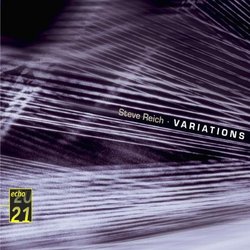| All Artists: Steve Reich, San Francisco Symphony, Edo de Waart Title: Variations (Dig) Members Wishing: 3 Total Copies: 0 Label: Deutsche Grammophon Original Release Date: 1/1/1936 Re-Release Date: 8/13/2002 Album Type: Original recording reissued, Original recording remastered Genre: Classical Style: Symphonies Number of Discs: 1 SwapaCD Credits: 1 UPC: 028947159124 |
Search - Steve Reich, San Francisco Symphony, Edo de Waart :: Variations (Dig)
CD Details |
CD ReviewsReich Re-Releases Daniel Johnson | 08/21/2002 (5 out of 5 stars) "Well, I'll come right out and say it. Six Pianos is not my new favorite Reich piece. And honestly, Music for Mallet Instruments, Voices and Organ will not be a revelation to anyone familiar with Reich's work in the 70's. In other words, the second and third tracks on this disc are merely perfect.The first piece, however, is more than virtuoso counterpoint. Variations for Winds, Strings and Keyboards--all right, so there isn't all that much variation--brings back the sensational, swelling harmonies that gave his Music for 18 Musicians that distinctively bittersweet, comforting sound, like a great pop song. It's a short piece (only about 20 minutes), but it has a great emotional as well as intellectual depth. This is a great disc not just for fans of minimalist music, but for anyone who enjoys smooth, lucid, but vibrant and sophisticated music, and has the patience to let it unfold around them." An entertaining tour of minimalism Christopher Culver | 05/12/2005 (3 out of 5 stars) "This installment in Deutsche Grammophon's "Echo 20/21" series of contemporary music reissues provides three pieces from the 1970s by minimalist composer Steve Reich. While the sort of music isn't really my cup of tea, the disc is fairly enjoyable.
Early pieces by Reich were generally meant to be performed by the composer and friends and then abandoned for newer works, and scores were not published. That changed, however, towards the late 1970s, and the "Variations for Winds, Strings, and Keyboards", performed here by the San Francisco Symphony conducted by Edo de Waart, is one of the pieces Reich opened up to the ensembles of the world. The work, comprising three sections, has an interesting structure. The keyboard instruments (two pianos and three electric organs) provide the foundation of the piece, performing throughout. On top of this basis the strings double the harmony of the organs, while flutes and oboes double more active keyboard music. The brass play an independent part, shimmering in and out in the first and third sections. The latter two pieces are earlier and performed by the composer's ensemble Steve Reich and Musicians. "Music for Mallet Instruments, Voices, and Organ" (1973) is an exploration of complex rhythmic changes. Voice here is used much like in the composer's "Drumming" or Ligeti's "Clouds and Clouds", that is, as an imitation of other instruments instead of a distinct song-like presence. I must admit that I do not understand the technical bases of the work well enough to appreciate the piece as well as the others. "Six Pianos" (1973) grew out of the desire to compose a piece for all pianos in a piano store, but Reich eventually discovered that the number should be limited. The piece begins with three pianists all playing the same eight-beat rhythmic pattern, but with different notes for each pianist. The other pianists then begin to slowly build the same pattern by substituting beats for rests. The effect is similar to "Drumming", but more successful. There is no virtuosity here, but the use of the piano much like a percussion instrument is fascinating. In fact, this piece, which I assumed would be the most limited with its featuring a single instrument, turns out to be the best on the disc. I admit it, I think minimalism is the greatest disaster to befall contemporary music, and has provided more charlatans than any other style. I prefer the zahlenmystik of Gubaidulina, the frenetic business of Lindberg, or even the academic dryness of the lab coat-wearing composer Boulez. Yet, I can appreciate many of the pieces here. "Six Pianos", with its relentlessly continual motions but gradual development is clearly a forerunner of the house music popular in the late 1990s. The music is technically innovative, giving great inspiration to other composers of the time such as Gyorgy Ligeti, even if the innovations are slow to appear. If you are collecting the "Echo 20/21" series, this disc shouldn't wait for last (although the other Reich "Echo 20/21" disc with "Drumming" certainly should." |

